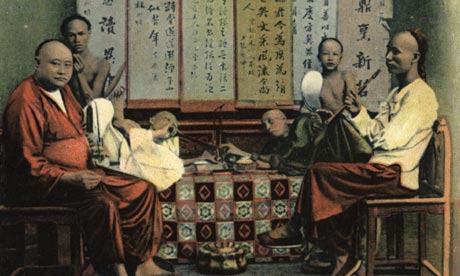Amitav Ghosh's second part of his historical trilogy is a marvel

Poppy days . . . Chinese opium smokers in Hong Kong, circa 1900. Photograph: Hulton Archive/Getty Images
Amitav Ghosh's two latest novels carry us deep inside the opium trade in the 1830s. River of Smoke is the second volume of a proposed trilogy. The first, Sea of Poppies, published in 2008, took us along the Ganges and to Calcutta, where the poppies are grown and the opium processed. River of Smoke follows the story through to Canton in China, where the opium is sold. The Chinese authorities are trying to prevent illegal imports of the drug, which has inflicted a plague of addiction on the Chinese population while making empire-sized fortunes for the irrepressibly shameless traders, mostly British.
 We get a moment's glimpse in River of Smoke, for example, inside a ship's cabin – and Ghosh can't resist explaining how a copper tub is "attached ingeniously to the ceiling, with removable trivets". Bahram, the Parsi opium trader from Bombay, whose story is the primary focus of the novel, likes to eat "a Xinjiang specialty called a samsa…": "these were small triangles of pastry, stuffed usually with minced meat: baked in portable Uighur tandoors they were sold hot in the Maidan . . . and were spoken of familiarly by their Hindusthani name – samosa". Every element, no matter how small, in the novel's world opens up to reveal the further worlds stacked up behind it.
We get a moment's glimpse in River of Smoke, for example, inside a ship's cabin – and Ghosh can't resist explaining how a copper tub is "attached ingeniously to the ceiling, with removable trivets". Bahram, the Parsi opium trader from Bombay, whose story is the primary focus of the novel, likes to eat "a Xinjiang specialty called a samsa…": "these were small triangles of pastry, stuffed usually with minced meat: baked in portable Uighur tandoors they were sold hot in the Maidan . . . and were spoken of familiarly by their Hindusthani name – samosa". Every element, no matter how small, in the novel's world opens up to reveal the further worlds stacked up behind it.Full review at The Guardian.
No comments:
Post a Comment